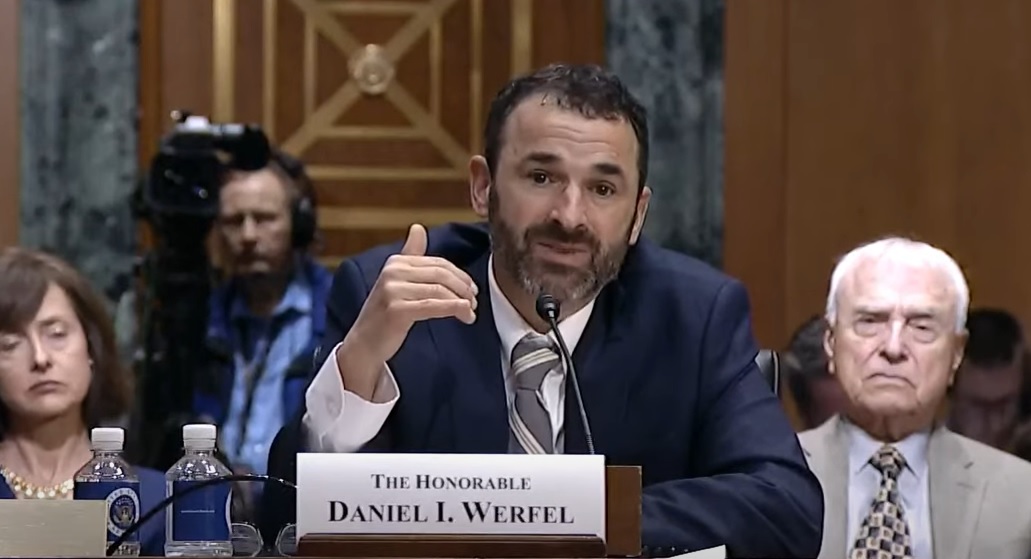A former IRS commissioner said on Thursday he believes new IRS chief Daniel Werfel is the right person to lead the agency during its $80 billion transformation—but added it will not be easy.

“Commissioner Werfel and I worked together when he was on my staff at Office of Management and Budget (OMB) during the Bush administration 20 years ago,” Mark Everson, who was commissioner of the IRS from 2003 to 2007, said in a statement emailed to CPA Practice Advisor. “He’s extremely well-suited for his current assignment, having strong management skills, an insider’s knowledge of Washington, and having already worked at the IRS. I commend President Biden on this choice. I’m confident Danny will do well.”
The Senate on March 9 confirmed Werfel as IRS commissioner by a 54-42 vote. Werfel served as acting IRS commissioner for several months in 2013 during the Obama administration.
He will now oversee the allocation of roughly $79.6 billion the IRS will receive over the next decade as part of the Inflation Reduction Act, which Biden signed into law last August. That money is expected to be used to modernize the agency’s outdated technology systems, improve taxpayer services, and to increase tax enforcement activities, among other things.
“Looking ahead to how the IRS will use its new Inflation Reduction Act funding, the agency has already developed an implementation plan for the significant incremental funding it received last year. One of Mr. Werfel’s first tasks will be to review that plan and make whatever adjustments he deems necessary. I hope that as he undertakes this task, he reaches out to tax practitioners for their input,” said Everson, who is currently vice chairman of tax consulting firm alliantgroup.
“The IRS needs to get this right,” he continued. “The new law’s allocation of $80 billion in additional IRS funding tilts heavily to enforcement, but both Commissioner Werfel and Treasury Secretary Janet Yellen have stated they will prioritize upgrading taxpayer services. The deployment of new technologies and hiring of additional staff should really help on this side of the house. It’s essential that taxpayers can get their questions answered in a timely manner and that all returns, be they paper or eFile, are processed promptly. And all of this has to be done with exacting attention to data security.”
According to an August Bloomberg report, the IRS has lost more than 23,000 employees since 2010—to 80,000 at the height of tax season last year—and it is estimated that the tax agency is going to lose approximately 50,000 more in the next five years due to retirement.
To replenish its workforce, the IRS is planning to hire nearly 87,000 full-time equivalent employees over the next 10 years—staff that range from customer service representatives to technology professionals to revenue agents, revenue officers, and special agents.
However, many Republican lawmakers have made the IRS a political target and have scoffed at the billions the agency will receive from the Inflation Reduction Act. GOP leaders have claimed that the IRS will use the new federal funding to hire “87,000 agents” in an effort to increase audits of the middle class—both of which the IRS said are not true. The IRS and Democrats have said the additional audit activity will affect only those making $400,000 or more. And once the GOP took control of the House of Representatives in January, Republicans passed bills to abolish the IRS and to replace federal income taxes with a national consumption tax. Both bills are expected to stall in the Democratic-controlled Senate.
“There’s a real food fight underway between the two political parties in Washington about how to balance the service and enforcement functions of the IRS. Everything the IRS does in coming years will be examined not just as a matter of tax administration, but also as to how it plays out politically. That’s unfortunate and it will make Commissioner Werfel’s job all the tougher,” Everson said.
So far, the IRS seems to be improving its processing of tax returns during the 2023 tax season compared to last year’s. As of the week ending Feb. 24, the IRS has received 45,983,000 returns, 45,722,000 of which have been processed, an increase of 4.3% from last year’s figures.
“The current filing season is off to a good start. Returns are being successfully processed and taxpayers are getting through to the IRS on the phone much more easily than in recent years,” Everson said. “Commissioner Werfel’s impact on the current filing season will be limited, unless he needs to step in to address unexpected problems. His impact will be seen increasingly as months unfold and in coming filing seasons.”
Earlier in his career, Werfel worked for the federal government under both Republican and Democratic administrations. He began his career at the OMB in 1997 during the Clinton administration as a policy analyst in the Office of Information and Regulatory Affairs. He continued his work at the OMB during the Bush and Obama administrations.
After serving as OMB deputy controller, Werfel was nominated by President Obama to be controller of the OMB in 2009, a post he served in for four years before becoming acting commissioner of the IRS on May 22, 2013.
Werfel followed Steven Miller as acting commissioner of the IRS after Miller resigned on May 15 of that year. Miller departed after the IRS admitted to improperly scrutinizing the federal tax-exempt status of some conservative groups. Werfel stayed on as acting commissioner until John Koskinen was nominated and confirmed as IRS commissioner later in 2013.
Werfel joined Boston Consulting Group in 2014 and was most recently the global leader of the consulting firm’s Public Sector practice. He previously led BCG’s Public Sector practice in North America.
“The IRS commissioner role is a big job. The IRS is always changing—just look at the new assignments it was given dispersing monies during the pandemic,” Everson said. “Beyond the processing of tax returns and the issuing of refunds, the agency has duties as far flung as the oversight of charities and work with counterpart tax administrations in other countries.”
Thanks for reading CPA Practice Advisor!
Subscribe Already registered? Log In
Need more information? Read the FAQs
Tags: IRS




